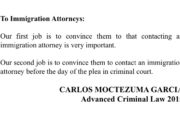Reckless Driving as Lesser Included Offense
of Aggravated Assault

In criminal law, a lesser included offense is a crime for which all of the elements (essential parts) necessary for a conviction are also elements found in a more serious crime. In Texas, usually you can determine a “lesser included” by listing all of the elements of one offense and seeing if other crimes can be created by the removal of any of those elements.
In limited circumstances, you must look beyond the statute to determine whether a crime has a lesser-included offense. Specifically, when the prosecution pleads (by information or indictment) allegations more specific than the bare statutory elements. This is how Reckless Driving may be a lesser-included offense of Aggravated Assault.
Is Reckless Driving a Lesser Included Offense of Aggravated Assault?
A person commits the crime of Reckless Driving if the person drives a vehicle in willful (sic) or wanton disregard for the safety of persons or property. Tex. Transp. Code § 545.401.

Texas courts have explained that “Reckless Driving” is lesser-included offense of “Aggravated Assault” when “driving” is alleged as the criminal conduct. Benge v. State, 94 S.W.3d 31, 36 (Tex. App.— Houston [14th Dist.] 2002) (lesser-included based on lesser culpable mental state). It is not a question of whether the offense charged is capable of being established on some theory that does not show the lesser included offense. Benge v. State, 94 S.W.3d 31, 35 (Tex. App. 2002). The “driving” element of reckless driving is included within the facts required to establish aggravated assault in this case. Id.
Reckless Driving meets the first prong for lesser-included offenses because the elements of reckless driving are included within the proof necessary to establish the commission of the offenses of aggravated assault and attempted aggravated assault as charged in this case. Dixon v. State, 358 S.W.3d 250, 257 (Tex. App— Houston [1st Dist.] 2011).
When “driving” is not alleged in the indictment of Aggravated Assault, then Reckless Driving is not a lesser-included offense. Rice v. State, 333 S.W.3d 140, 145 (Tex. Crim. App. 2011). However, Rice explains, “[T]he manner alleged will determine the availability of lesser-included offenses.” Rice v. State, 333 S.W.3d 140, 145 (Tex. Crim. App. 2011).
Evidence of Lesser Included Offense

In all circumstances, there are two prongs for determining the trial judge should instruct a jury on a lesser included charge. The first, is the less serious charge legally a lesser included of the pled charge? This is a legal question, and for Reckless Driving and Aggravated Assault, some notes for your research are included above.
The second prong is whether the evidence gives rise to the necessity to instruct the jury on the lesser charge.
The most common circumstance a jury instruction is given on a lesser included offense is when some affirmative evidence (regardless of how weak or conflicting) would prove that the accused is not guilty of the greater charge but is guilty of a lesser charge. For instance, a person is charged with Aggravated Assault for causing serious bodily injury. The defense presents evidence that the victim did not suffer serious bodily injury, instead only suffered bodily injury.
A less often relied upon situation for seeking a lesser included instruction is the “Multiple Reasonable Inferences” from the same evidence. This means, that when a reasonable jury looks at the evidence presented, that jury could find the accused guilty of either, the pled charge or lesser included. This may apply most often to different culpable mental states.
During questioning, a witness may testify that viewing the conduct of the accused a reasonable person could think it was reckless or criminally negligent. If talking about the results of conduct, a witness may explain, the outcome of the accused’s conduct could have reasonably resulted from less culpable mental state or an unawareness of the “risk” pled in the prosecution’s case.
Not Complete, but seed language for your requested jury charge
A person commits the offense of Reckless Driving if the person drives a vehicle in willful or wanton disregard for the safety of persons or property.
To prove that the defendant is guilty of Reckless Driving, the state must prove, beyond a reasonable doubt, two elements. The elements are that:
- The defendant drove a vehicle;
- With a willful and wanton disregard for the safety of person or property.
[Include relevant application of law to facts unit from the law of the charged offense.]
If you believe from the evidence beyond a reasonable doubt that the defendant is guilty of either Manslaughter/Negligent Homicide/Aggravated Assault on the one hand or Reckless Driving on the other hand, but you have a reasonable doubt as to which of said offenses he is guilty, then you must resolve that doubt in the defendant’s favor and find him guilty of the lesser included offense.
Alternatively…
If you have a reasonable doubt as to any element of the offense of Aggravated Assault, then you should consider whether the defendant is guilty of Reckless Driving.


